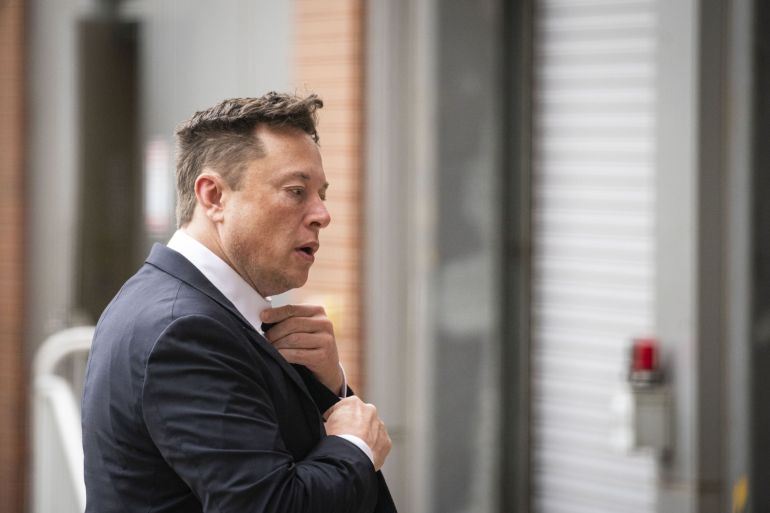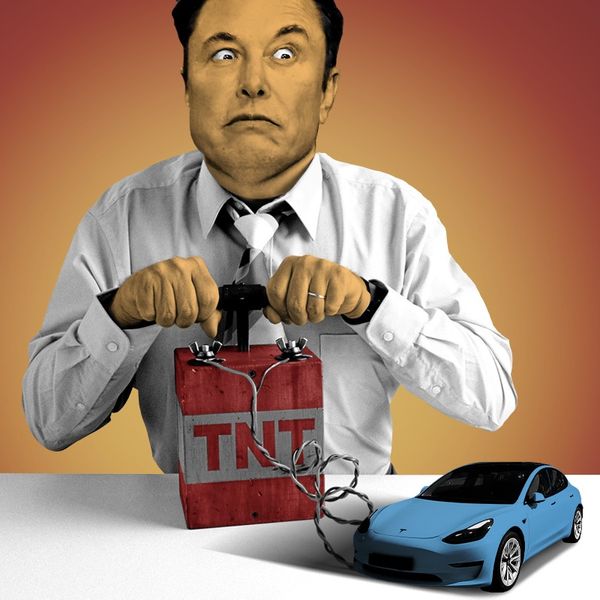Elon Musk Could Be Booted From Tesla? CEO Faces Growing Investor Discontent, Ownership Ambitions, And Market Valuation Decline Adding To Musk’s Woes
Elon Musk, CEO of Tesla, has recently voiced concerns about the possibility of being removed from his position at the electric vehicle company. The apprehension comes in the wake of Tesla's stock crash, which saw a significant drop in market capitalization and stock value. Despite Musk's influential role and innovative endeavors, his relatively small stake in Tesla has led to speculation about his continued leadership within the company. Musk, is currently facing a period of investor dissatisfaction amidst the company's turbulent performance. Amidst concerns over Tesla's strategic direction and Musk's involvement with other ventures, including the acquisition of the social media platform X, he has voiced intentions to secure greater voting control before expanding into artificial intelligence (AI) development outside Tesla. This comes as Tesla faces its most challenging start to a year yet, with significant market valuation losses and various operational hurdles. The downturn has not only impacted Tesla but also led to a substantial personal loss for Musk himself. These challenges come amid a series of adverse developments, including ongoing issues at the Red Sea and various operational hurdles within the company.

Elon Musk is apprehensive about the possibility of being ousted as Tesla’s CEO, a concern stemming from the company’s recent stock crash, resulting in a $82 billion decrease in market capitalization and a 12% decline in stock value in just one day.
As CEO of Tesla, Musk has expressed worries about the potential for his removal due to his relatively modest stake of approximately 12 percent in the company.
Musk humorously referred to shareholder advisory firms like Glass Lewis and Institutional Shareholder Services as “ISIS,” highlighting their influence during an earnings call,
Musk has discussed the prospect of boosting his ownership to at least 25 percent through avenues such as creating a dual class of shares, similar to Meta Platforms.
This revelation follows Musk’s recent plea to Tesla’s board for a substantial stock award and his sale of nearly $40 billion in Tesla stock to address tax obligations and finance his acquisition of the social media platform Twitter, now known as X.
During the earnings call, Musk redirected the conversation towards Tesla’s potential in artificial intelligence (AI) and robotics, emphasizing his dedication to these fields. He indicated that without a minimum 25 percent stake in Tesla, he would explore AI and robotics development elsewhere.

Future Prospects VS Tesla
While Musk explores future opportunities, the ramifications of concerns regarding potential leadership changes on Tesla’s trajectory and the electric vehicle industry remain uncertain.
Notably, Elon Musk is engaged in various ventures, including ownership and management roles in companies like Tesla, SpaceX, The Boring Company, and Neuralink, and his acquisition of the social media platform X for $44 billion.
Growing Investor Concerns
Elon Musk is grappling with significant investor dissatisfaction at Tesla and has expressed (as mentioned above) his desire to attain a 25 percent voting control before venturing into the development of artificial intelligence (AI) products outside the scope of Tesla Inc.
Presently, Musk holds a stake of over 12 percent in the electric vehicle giant and has shared his perspective on Tesla’s organizational structure, likening it to a conglomerate comprised of several startups.
He has drawn parallels with General Motors Corp., a traditional leader in the global auto industry, urging a closer examination of Tesla’s positioning.
Despite being the largest individual shareholder in Tesla, Musk has refrained from elaborating further on his considerations.
Facing shareholder discontent on multiple fronts, including concerns about succession planning at Tesla and allegations of diversion due to his involvement with X, the platform formerly known as Twitter, which he assumed control of in 2022, Musk has voiced his discomfort.
In a post on X, he stated, “I am uneasy about expanding Tesla’s leadership in AI & robotics without securing approximately 25 percent voting control.” He emphasized the need for enough influence to effect meaningful change but not to the extent where his decisions cannot be questioned.
In addition, Tesla, which experienced a remarkable performance in 2023 with its shares more than doubling, has encountered a turbulent start to 2024, marking its worst beginning to any year in its history.
According to a report by the South China Morning Post, the electric vehicle (EV) manufacturer has suffered a substantial loss of over $94 billion in market valuation within the first two weeks of the year.
Several adverse developments, including a reversal on EVs by car rental giant Hertz Global Holdings, continual price reductions for its China-made cars, and indications of rising labor costs, have contributed to this downturn.
These challenges coincide with a slowdown in the growth of EV demand, particularly in the United States, and the ongoing disruptions at the Red Sea, which are significantly impacting Tesla’s shipping operations.

Personal Losses
Elon Musk’s Tesla has suffered a staggering loss of $94 billion in market valuation amid a slowdown in the global electric vehicle (EV) market.
Alongside Tesla’s decline, Musk himself incurred significant personal losses, with Bloomberg’s Billionaire Index reporting a decrease of over $23 billion in his wealth.
Tesla faces numerous challenges, including complications arising from ongoing issues at the Red Sea.
Following a prosperous 2023 where Tesla’s shares more than doubled, the company has encountered a tumultuous start to 2024, marking its worst beginning to any year in its history.
Tesla’s Challenges
The South China Morning Post’s report also highlights Tesla’s substantial market valuation decline within the first two weeks of the year.
Several adverse developments have contributed to Tesla’s challenges, including Hertz Global Holdings’ reversal on EVs, continuous price reductions for its China-made cars, and indications of rising labor costs.
These difficulties coincide with a slowdown in EV demand, particularly in the United States, compounded by disruptions in Tesla’s shipping channels due to ongoing issues at the Red Sea.
Analysts quoted in the SCMP report emphasize investors’ concerns about Tesla’s stagnant growth, accentuated by price cuts in China, indicating intense competition in the EV market.
Tesla’s market capitalization has experienced its most significant drop since going public in 2010, with a 12% decrease since the beginning of January, the largest decline in percentage terms since 2016.
Tesla’s aggressive reduction of car prices since early 2023 has aimed to boost demand but has resulted in substantial erosion of profit margins.
Additionally, geopolitical concerns in the Red Sea have led to the redirection of shipments intended for Tesla’s Berlin plant, resulting in the suspension of most production at its German facility.
Despite exceeding expectations in fourth-quarter delivery numbers, Tesla trails behind China’s BYD Co in global electric car sales, leading to a significant contrast in its stock performance.
In 2023, Tesla ranked as the eighth-best performer in the S&P 500, while in 2024, it currently ranks as the eighth-worst.
The financial downturn has also impacted Musk personally, with a $23 billion decrease in his net worth this year. As the world’s richest person last year, Musk faces competition from Amazon.com founder Jeff Bezos, who is rapidly closing the gap in net worth.
Despite these challenges, Tesla still retains its position as a vital player in the global transition to electric vehicles, maintaining its market leadership in the U.S.
However, Tesla’s past success and high expectations may be contributing to its current market struggles, with its valuation susceptible to negative news amid fierce competition and a changing landscape in the EV market.

The Last Bit, Elon Musk’s Tesla has encountered substantial challenges, including a notable decrease in market valuation amounting to $94 billion, alongside personal losses for Musk himself.
These difficulties coincide with a slowdown in the global electric vehicle market and are compounded by ongoing issues such as disruptions at the Red Sea and operational hurdles within the company.
Despite these setbacks, Tesla remains a key player in the transition to electric vehicles, maintaining its market leadership in the U.S.
However, the company’s past success and high expectations have contributed to its current struggles, with its valuation vulnerable to negative news amidst fierce competition in the EV market; hence if these challenges will lead to the ouster of Musk Remains to be seen.




